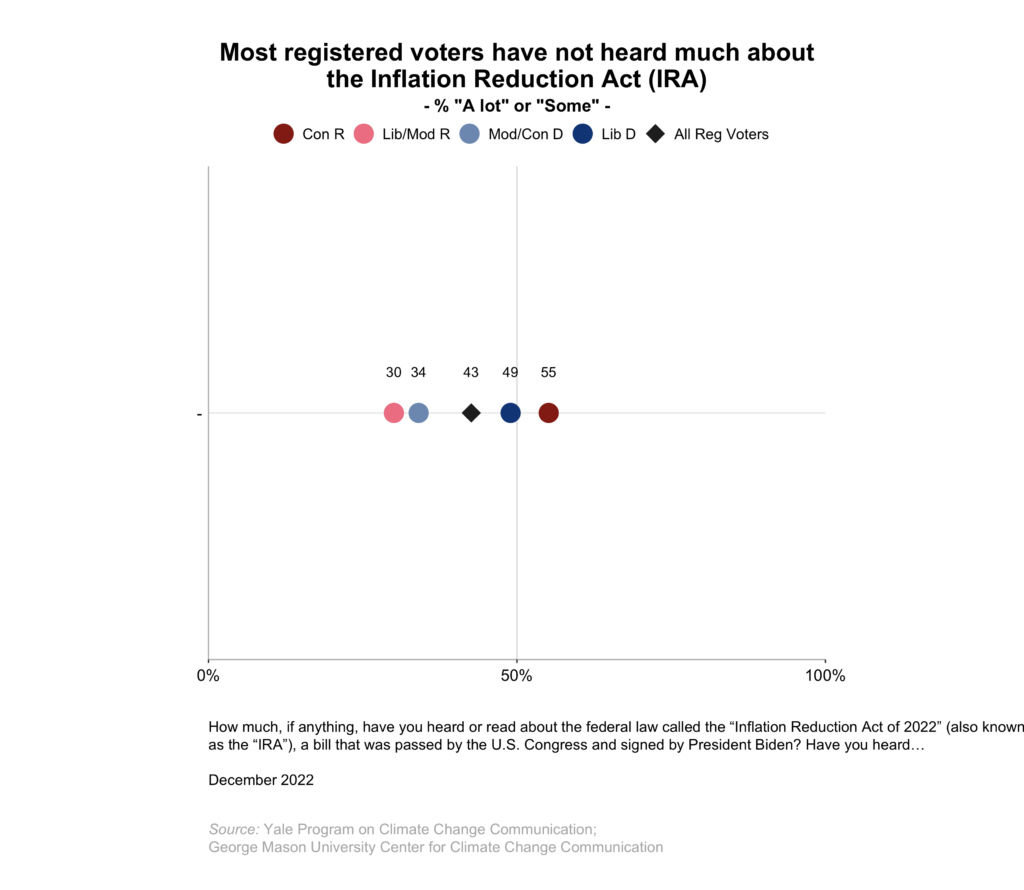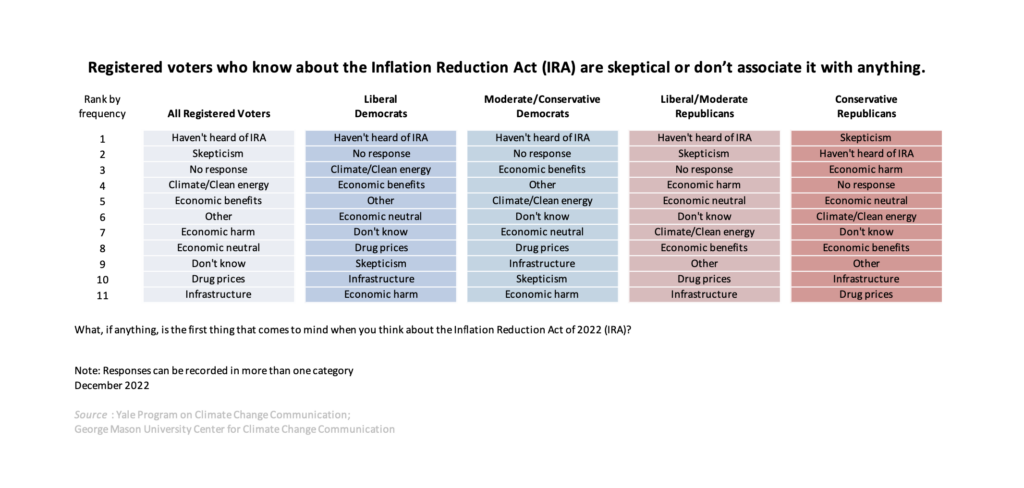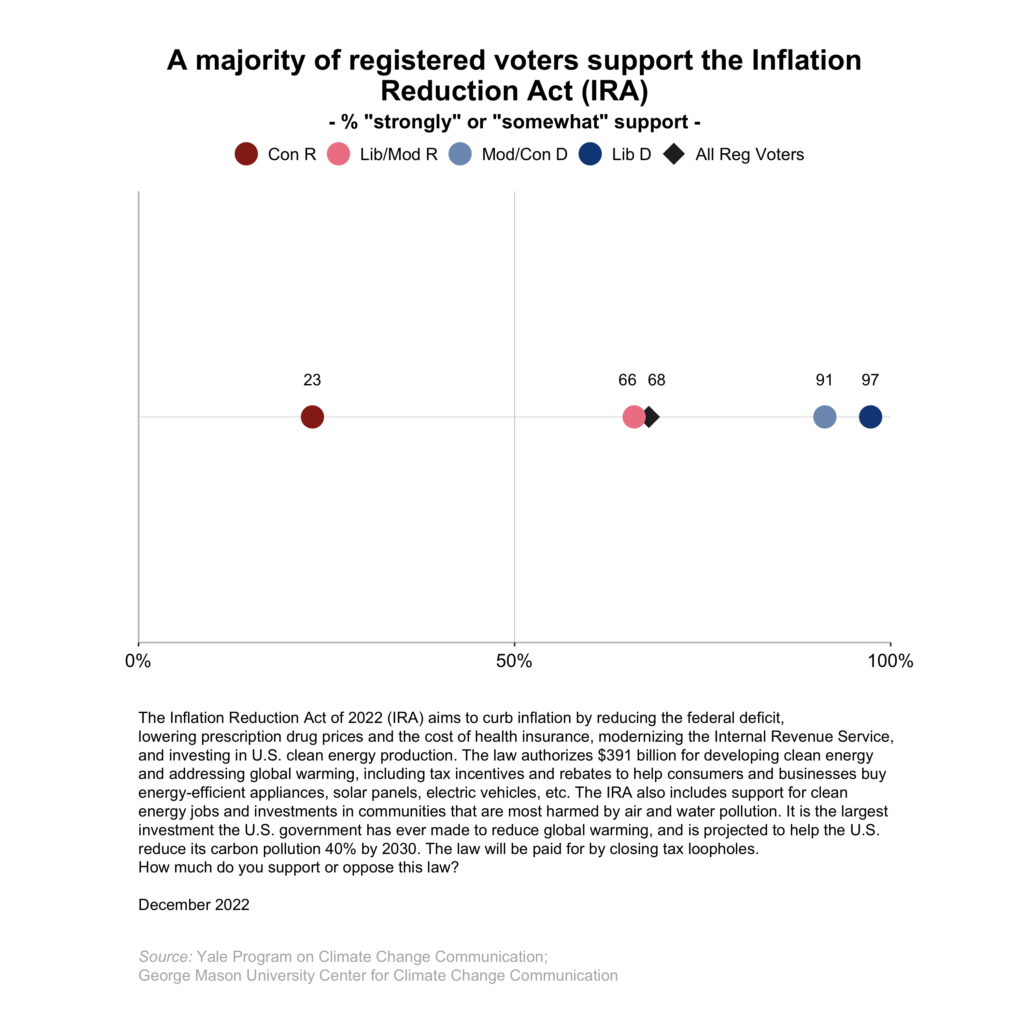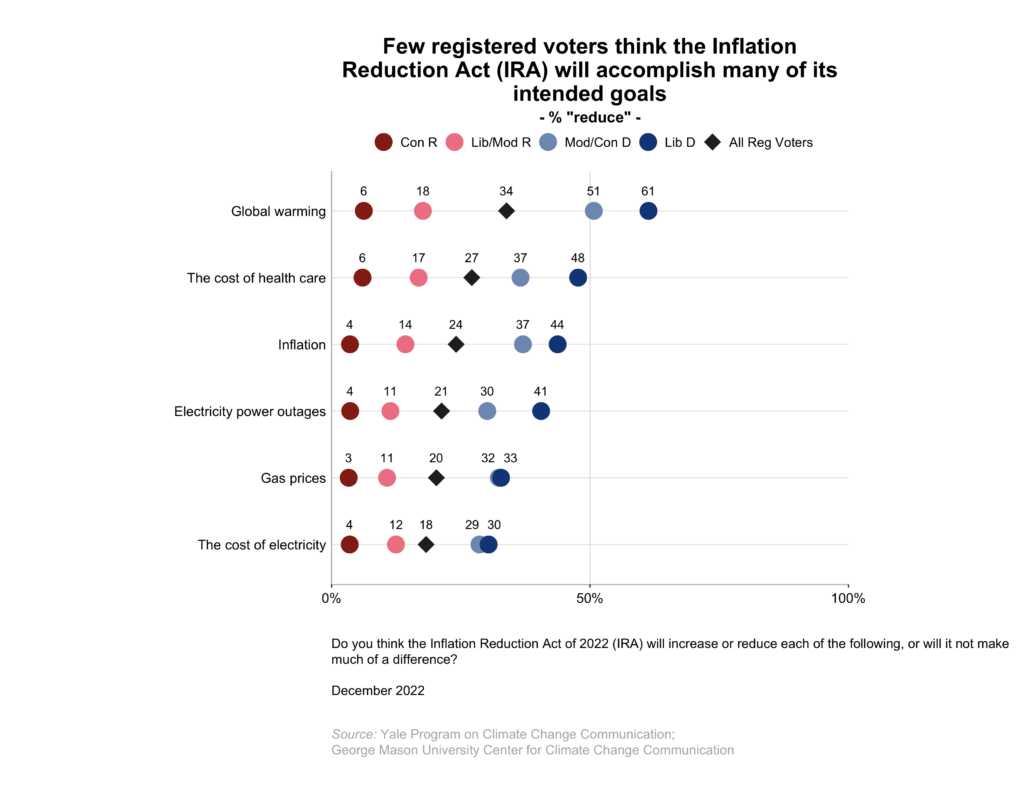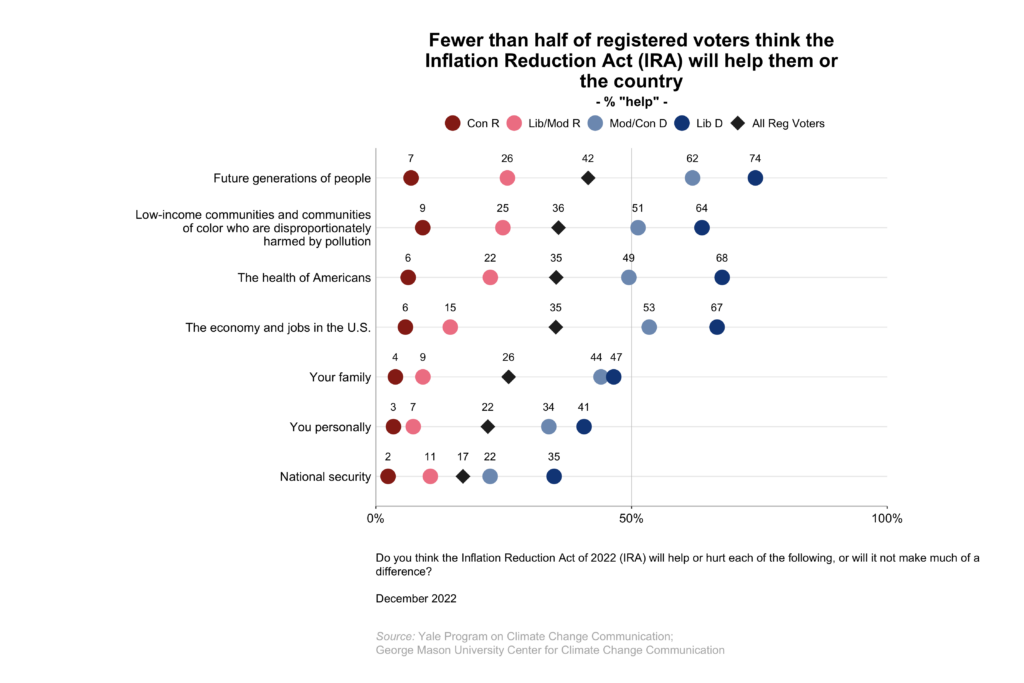Report · Jan 31, 2023
Climate Change in the American Mind: Politics & Policy, December 2022
By Anthony Leiserowitz, Edward Maibach, Seth Rosenthal, John Kotcher, Jennifer Carman, Sanguk Lee, Marija Verner, Matthew Ballew, Patrick Owusu Ansah, Nicholas Badullovich, Teresa Myers, Matthew Goldberg and Jennifer Marlon
Filed under: Policy & Politics
4. Special Section: The Inflation Reduction Act (IRA)
4.1. Most registered voters have not heard much about the Inflation Reduction Act (IRA).
On August 16, 2022, President Biden signed the Inflation Reduction Act (IRA) into law. The law aims to curb inflation by reducing the federal deficit, lowering prescription drug prices and the cost of health insurance, modernizing the Internal Revenue Service, and investing in U.S. clean energy production. The law authorizes $391 billion for developing clean energy and addressing global warming, including tax incentives and rebates to help consumers and businesses buy energy-efficient appliances, solar panels, electric vehicles, etc. The IRA also includes support for clean energy jobs and investments in communities that are most harmed by air and water pollution. It is the largest investment the U.S. government has ever made to reduce global warming, and is projected to help the U.S. reduce its carbon pollution 40% by 2030. The law will be paid for by closing tax loopholes.
Two in three registered voters (67%) have heard at least “a little” about the Inflation Reduction Act of 2022 (IRA; see data tables, p. 51), including about four in ten (43%) who have heard either “a lot” (13%) or “some” (29%) about it. A majority of conservative Republicans (55%) and about half of liberal Democrats (49%) have heard “a lot” or “some” about the IRA, while fewer moderate/conservative Democrats (34%) or liberal/moderate Republicans (30%) have done so. One in three registered voters (33%) have heard “nothing at all” about the IRA (see data tables).
4.2. Registered voters who know about the Inflation Reduction Act (IRA) are skeptical or don’t associate it with anything.
As noted in Section 4.1, 67% of registered voters have heard at least “a little” about the Inflation Reduction Act of 2022 (IRA). All survey participants who said they had heard at least “a little” about the IRA were then asked the open-ended question: “What, if anything, is the first thing that comes to mind when you think about the Inflation Reduction Act of 2022 (IRA)?” Responses to that question were then categorized for analysis (see data tables, p. 51).A doctoral student and a postdoctoral fellow coded the open-ended responses using instructions and categories developed by one of the Primary Investigators. Percent agreement ranged from 93% – 99% for the categories coded. Differences between the two coders were resolved via discussion between them and the Primary Investigator. “Haven’t heard about IRA” classification was determined by a “nothing at all” response to the preceding question, “How much, if anything, have you heard about the Inflation Reduction Act of 2022 (also known as the IRA), a bill that was passed by the U.S. Congress and signed by President Biden?” Participants who provided that response were not shown this open-ended question. Definitions of the other categories used by the coders can be found in Appendix II, p. 68.
Of those registered voters who have heard about the IRA and provided an association, the most common association reflected “skepticism” (e.g., it is government waste, will not accomplish its goals; 16%). The next most common associations were climate and clean energy (8%) and economic benefits (8%).
Among the political groups, the most common associations were: Liberal Democrats: climate/clean energy (15%); moderate/conservative Democrats: economic benefits (11%); liberal/moderate Republicans: skepticism (18%); and conservative Republicans: skepticism (42%). Overall, conservative Republicans were the political group most likely to associate the IRA with any particular response.
4.3. A majority of registered voters support the Inflation Reduction Act (IRA).
After reading a brief description of the Inflation Reduction Act (IRA), about two in three registered voters (68%) say they support it (34% “strongly support” and 34% “somewhat support”). Nearly all liberal Democrats (97%) and moderate/conservative Democrats (91%) support the IRA, as do two in three liberal/moderate Republicans (66%). By contrast, 23% of conservative Republicans support the IRA, while 75% oppose it (including 55% who strongly oppose it; see data tables, p. 52).
4.4. Few registered voters think the Inflation Reduction Act (IRA) will accomplish many of its intended goals.
About four in ten registered voters (41%) think the Inflation Reduction Act (IRA) will increase innovation in clean energy technologies (not pictured in the figure; see data tables, p. 54). This includes 65% of liberal Democrats, 49% of moderate/conservative Democrats, 35% of liberal/moderate Republicans, and 19% of conservative Republicans. However, fewer registered voters think the IRA will accomplish many of its other intended goals, such as reducing:
- Global warming: 34% of registered voters think the IRA will reduce it; 61% of liberal Democrats, 51% of moderate/conservative Democrats, 18% of liberal/moderate Republicans, 6% of conservative Republicans.
- The cost of health care: 27% of registered voters; 48% of liberal Democrats, 37% of moderate/conservative Democrats, 17% of liberal/moderate Republicans, 6% of conservative Republicans.
- Inflation: 24% of registered voters; 44% of liberal Democrats, 37% of moderate/conservative Democrats, 14% of liberal/moderate Republicans, 4% of conservative Republicans.
- Electricity power outages: 21% of registered voters; 41% of liberal Democrats, 30% of moderate/conservative Democrats, 11% of liberal/moderate Republicans, 4% of conservative Republicans.
- Gas prices: 20% of registered voters; 33% of liberal Democrats, 32% of moderate/conservative Democrats, 11% of liberal/moderate Republicans, 3% of conservative Republicans.
- The cost of electricity: 18% of registered voters; 30% of liberal Democrats, 29% of moderate/conservative Democrats, 12% of liberal/moderate Republicans, 4% of conservative Republicans.
4.5. Fewer than half of registered voters think the Inflation Reduction Act (IRA) will help them or the country.
Fewer than half of registered voters think the Inflation Reduction Act (IRA) will help the following groups of people or the country, including:
- Future generations of people: 42% of registered voters; 74% of liberal Democrats, 62% of moderate/conservative Democrats, 26% of liberal/moderate Republicans, and 7% of conservative Republicans.
- Low-income communities and communities of color who are disproportionately harmed by pollution: 36% of registered voters; 64% of liberal Democrats, 51% of moderate/conservative Democrats, 25% of liberal/moderate Republicans, and 9% of conservative Republicans.
- The health of Americans: 35% of registered voters; 68% of liberal Democrats, 49% of moderate/conservative Democrats, 22% of liberal/moderate Republicans, and 6% of conservative Republicans.
- The economy and jobs in the U.S.: 35% of registered voters; 67% of liberal Democrats, 53% of moderate/conservative Democrats, 15% of liberal/moderate Republicans, and 6% of conservative Republicans.
- Their family: 26% of registered voters; 47% of liberal Democrats, 44% of moderate/conservative Democrats, 9% of liberal/moderate Republicans, and 4% of conservative Republicans.
- Them personally: 22% of registered voters; 41% of liberal Democrats, 34% of moderate/conservative Democrats, 7% of liberal/moderate Republicans, and 3% of conservative Republicans.
- National security: 17% of registered voters; 35% of liberal Democrats, 22% of moderate/conservative Democrats, 11% of liberal/moderate Republicans, and 2% of conservative Republicans.
